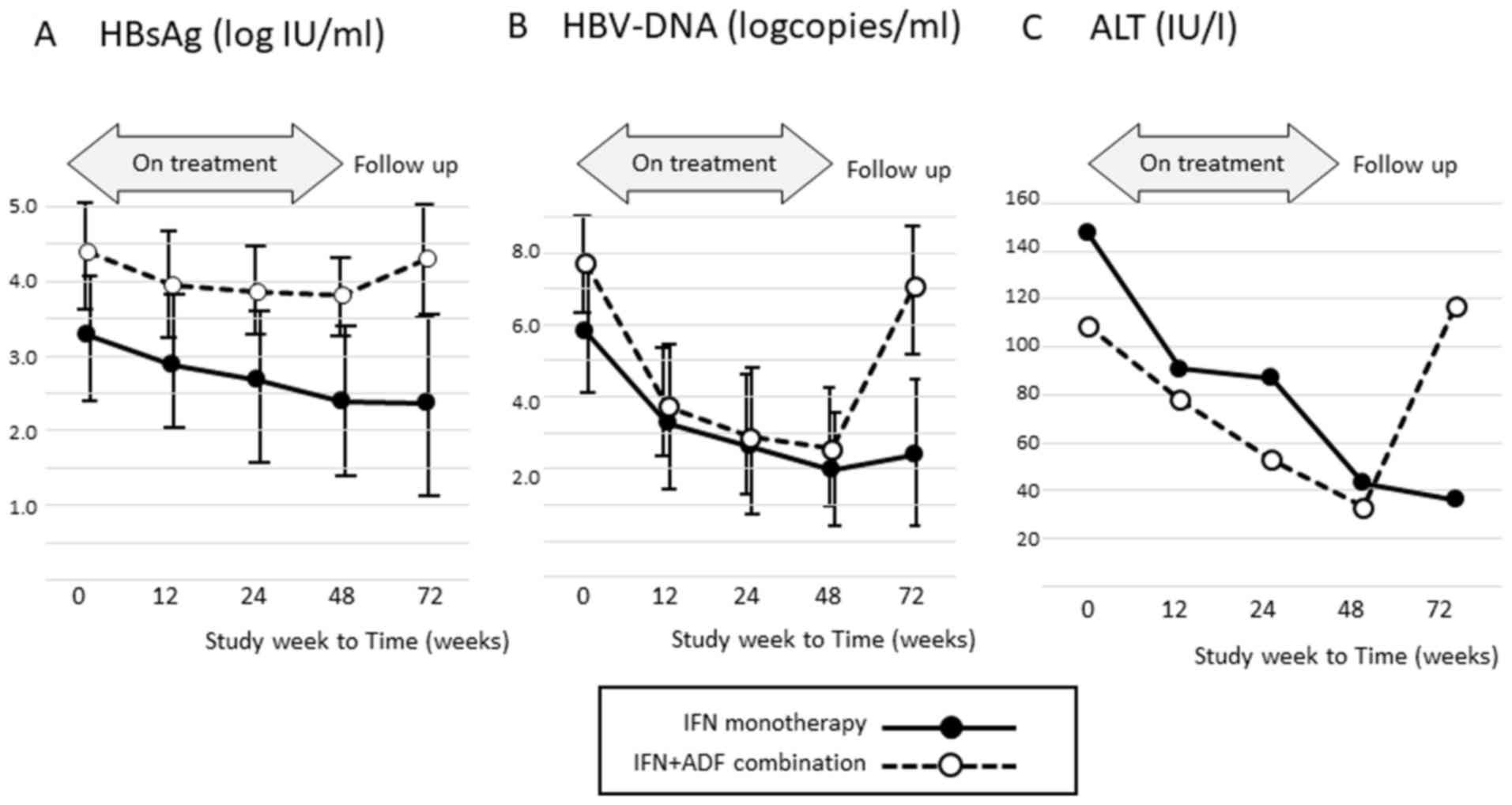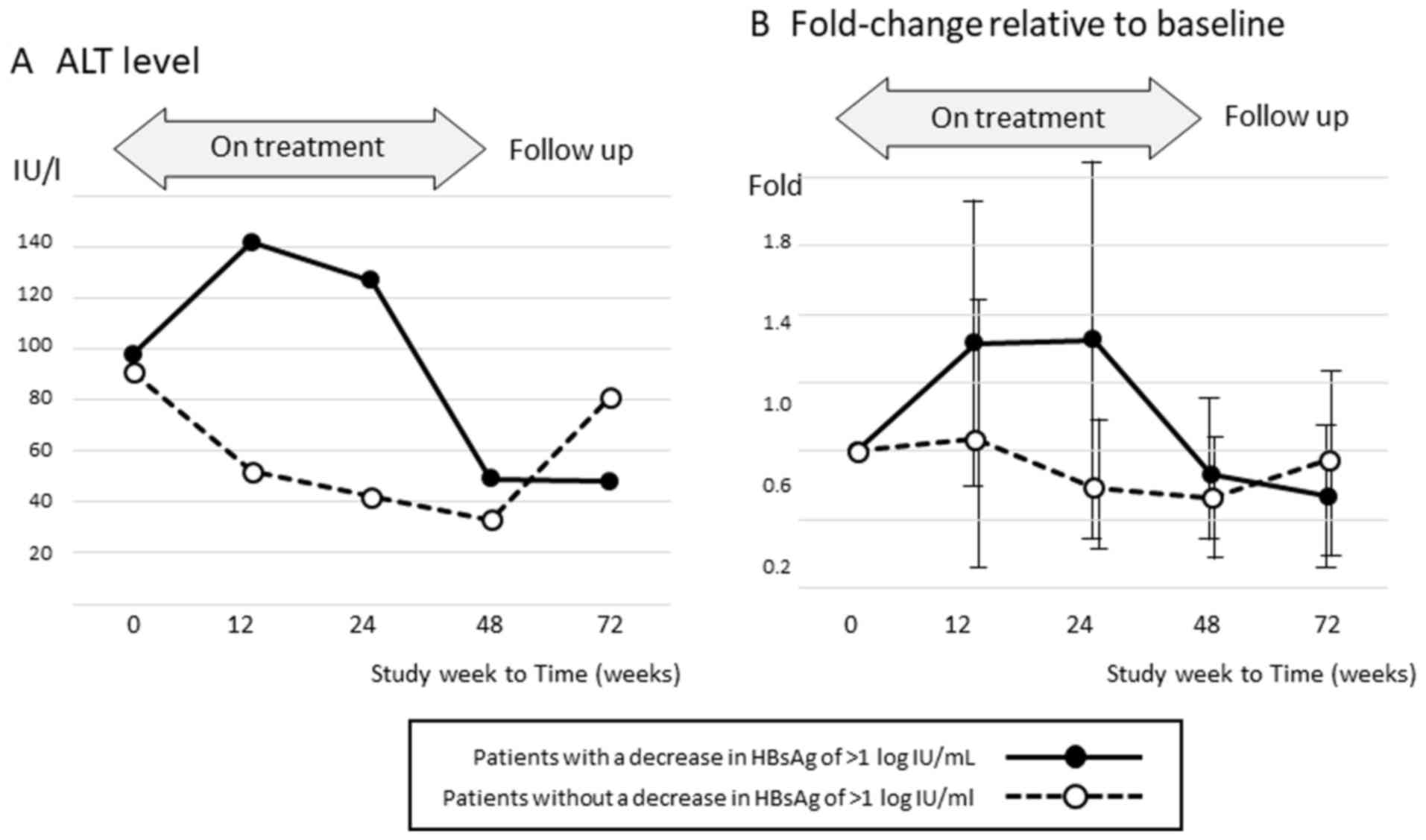|
1
|
Lok AS and McMahon BJ: Chronic hepatitis
B: Update 2009. Hepatology. 50:661–662. 2009. View Article : Google Scholar : PubMed/NCBI
|
|
2
|
European Association For The Study Of The
Liver, . EASL clinical practice guidelines: Management of chronic
hepatitis B virus infection. J Hepatol. 57:167–185. 2012.
View Article : Google Scholar : PubMed/NCBI
|
|
3
|
Liaw YF, Kao JH, Piratvisuth T, Chan HLY,
Chien RN, Liu CJ, Gane E, Locarnini S, Lim SG, Han KH, et al:
Asian-Pacific consensus statement on the management of chronic
hepatitis B: A 2012 update. Hepatol Int. 6:531–561. 2012.
View Article : Google Scholar : PubMed/NCBI
|
|
4
|
Marcellin P, Martinot-Peignoux M, Asselah
T, Batrla R, Messinger D, Rothe V, Lau G and Liaw YF: Serum levels
of Hepatitis B surface antigen predict severity of fibrosis in
patients with E antigen-positive chronic Hepatitis B. Clin
Gastroenterol Hepatol. 13:1532–9.e1. 2015. View Article : Google Scholar : PubMed/NCBI
|
|
5
|
Shouval D: Focus: Quantitative HBsAg
measurement as a new surrogate marker for assessment of hepatic
fibrosis in HBeAg+ chronic hepatitis B. J Hepatol. 58:1063–1064.
2013. View Article : Google Scholar : PubMed/NCBI
|
|
6
|
Kim GA, Lim YS, An J, Lee D, Shim JH, Kim
KM, Lee HC, Chung YH, Lee YS and Suh DJ: HBsAg seroclearance after
nucleoside analogue therapy in patients with chronic hepatitis B:
Clinical outcomes and durability. Gut. 63:1325–1332. 2014.
View Article : Google Scholar : PubMed/NCBI
|
|
7
|
Hynicka LM, Yunker N and Patel PH: A
review of oral antiretroviral therapy for the treatment of chronic
hepatitis B. Ann Pharmacother. 44:1271–1286. 2010. View Article : Google Scholar : PubMed/NCBI
|
|
8
|
Lam YF, Yuen MF, Seto WK and Lai CL:
Current antiviral therapy of chronic hepatitis B: Efficacy and
safety. Curr Hepat Rep. 10:235–243. 2011. View Article : Google Scholar : PubMed/NCBI
|
|
9
|
Shi Y, Wu YH, Shu ZY, Zhang WJ, Yang J and
Chen Z: Interferon and lamivudine combination therapy versus
lamivudine monotherapy for hepatitis B e antigen-negative hepatitis
B treatment: A meta-analysis of randomized controlled trials.
Hepatobiliary Pancreat Dis Int. 9:462–472. 2010.PubMed/NCBI
|
|
10
|
Huang R, Hao Y, Zhang J and Wu C:
Interferon-alpha plus adefovir combination therapy versus
interferon-alpha monotherapy for chronic hepatitis B treatment: A
meta-analysis. Hepatol Res. 43:1040–1051. 2013.PubMed/NCBI
|
|
11
|
Lau GK, Piratvisuth T, Luo KX, Marcellin
P, Thongsawat S, Cooksley G, Gane E, Fried MW, Chow WC, Paik SW, et
al: Peginterferon alfa-2a HBeAg-positive chronic Hepatitis B study
group: Peginterferon Alfa-2a, lamivudine, and the combination for
HBeAg-positive chronic hepatitis B. N Engl J Med. 352:2682–2695.
2005. View Article : Google Scholar : PubMed/NCBI
|
|
12
|
Marcellin P, Lau GK, Bonino F, Farci P,
Hadziyannis S, Jin R, Lu ZM, Piratvisuth T, Germanidis G, Yurdaydin
C, et al: Peginterferon alfa-2a HBeAg-negative chronic hepatitis B
study group: Peginterferon alfa-2a alone, lamivudine alone, and the
two in combination in patients with HBeAg-negative chronic
hepatitis B. N Engl J Med. 351:1206–1217. 2004. View Article : Google Scholar : PubMed/NCBI
|
|
13
|
Marcellin P, Wursthorn K, Wedemeyer H,
Chuang WL, Lau G, Avila C, Peng CY, Gane E, Lim SG, Fainboim H, et
al: Telbivudine plus pegylated interferon alfa-2a in a randomized
study in chronic hepatitis B is associated with an unexpected high
rate of peripheral neuropathy. J Hepatol. 62:41–47. 2015.
View Article : Google Scholar : PubMed/NCBI
|
|
14
|
Wursthorn K, Lutgehetmann M, Dandri M,
Volz T, Buggisch P, Zollner B, Longerich T, Schirmacher P, Metzler
F, Zankel M, et al: Peginterferon alpha-2b plus adefovir induce
strong cccDNA decline and HBsAg reduction in patients with chronic
hepatitis B. Hepatology. 44:675–684. 2006. View Article : Google Scholar : PubMed/NCBI
|
|
15
|
Takkenberg B, Terpstra V, Zaaijer H,
Weegink C, Dijkgraaf M, Jansen P, Beld M and Reesink H:
Intrahepatic response markers in chronic hepatitis B patients
treated with peginterferon alpha-2a and adefovir. J Gastroenterol
Hepatol. 26:1527–1535. 2011. View Article : Google Scholar : PubMed/NCBI
|
|
16
|
Takkenberg RB, Jansen L, de Niet A,
Zaaijer HL, Weegink CJ, Terpstra V, Dijkgraaf MG, Molenkamp R,
Jansen PL, Koot M, et al: Baseline hepatitis B surface antigen
(HBsAg) as predictor of sustained HBsAg loss in chronic hepatitis B
patients treated with pegylated interferon-α2a and adefovir.
Antivir Ther. 18:895–904. 2013. View
Article : Google Scholar : PubMed/NCBI
|
|
17
|
Xie QL, Zhu Y, Wu LH, Fu LL and Xiang Y:
The efficacy and safety of entecavir and interferon combination
therapy for chronic hepatitis B virus infection: A meta-analysis.
PLoS One. 10:e01322192015. View Article : Google Scholar : PubMed/NCBI
|
|
18
|
Buster EH, Flink HJ, Cakaloglu Y, Simon K,
Trojan J, Tabak F, So TM, Feinman SV, Mach T, Akarca US, et al:
Sustained HBeAg and HBsAg loss after long-term follow-up of
HBeAg-positive patients treated with peginterferon alpha-2b.
Gastroenterology. 135:459–467. 2008. View Article : Google Scholar : PubMed/NCBI
|
|
19
|
Moucari R, Korevaar A, Lada O,
Martinot-Peignoux M, Boyer N, Mackiewicz V, Dauvergne A, Cardoso
AC, Asselah T, Nicolas-Chanoine MH, et al: High rates of HBsAg
seroconversion in HBeAg-positive chronic hepatitis B patients
responding to interferon: A long-term follow-up study. J Hepatol.
50:1084–1092. 2009. View Article : Google Scholar : PubMed/NCBI
|
|
20
|
Seo Y and Yano Y: Short- and long-term
outcome of interferon therapy for chronic hepatitis B infection.
World J Gastroenterol. 20:13284–13292. 2014. View Article : Google Scholar : PubMed/NCBI
|
|
21
|
Croagh CM, Desmond PV and Bell SJ:
Genotypes and viral variants in chronic hepatitis B: A review of
epidemiology and clinical relevance. World J Hepatol. 7:289–303.
2015. View Article : Google Scholar : PubMed/NCBI
|
|
22
|
Howard CR: The structure of hepatitis B
envelope and molecular variants of hepatitis B virus. J Viral
Hepat. 2:165–170. 1995. View Article : Google Scholar : PubMed/NCBI
|
|
23
|
Höner Zu, Siederdissen C and Cornberg M:
The role of HBsAg levels in the current management of chronic HBV
infection. Ann Gastroenterol. 27:105–112. 2014.PubMed/NCBI
|
|
24
|
Brunetto MR, Moriconi F, Bonino F, Lau GK,
Farci P, Yurdaydin C, Piratvisuth T, Luo K, Wang Y, Hadziyannis S,
et al: Hepatitis B virus surface antigen levels: A guide to
sustained response to peginterferon alfa-2a in HBeAg-negative
chronic hepatitis B. Hepatology. 49:1141–1150. 2009. View Article : Google Scholar : PubMed/NCBI
|
|
25
|
Moucari R, Mackiewicz V, Lada O, Ripault
MP, Castelnau C, Martinot-Peignoux M, Dauvergne A, Asselah T, Boyer
N, Bedossa P, et al: Early serum HBsAg drop: A strong predictor of
sustained virological response to pegylated interferon alfa-2a in
HBeAg-negative patients. Hepatology. 49:1151–1157. 2009. View Article : Google Scholar : PubMed/NCBI
|
|
26
|
Dando T and Plosker G: Adefovir dipivoxil:
A review of its use in chronic hepatitis B. Drugs. 63:2215–2234.
2003. View Article : Google Scholar : PubMed/NCBI
|
|
27
|
Cheng PN, Liu WC, Tsai HW, Wu IC, Chang TT
and Young KC: Association of intrahepatic cccDNA reduction with the
improvement of liver histology in chronic hepatitis B patients
receiving oral antiviral agents. J Med Virol. 83:602–607. 2011.
View Article : Google Scholar : PubMed/NCBI
|
|
28
|
Hansen BE, Rijckborst V, Ter Borg MJ and
Janssen HL: HBV DNA suppression in HBeAg-positive chronic hepatitis
B patients treated with peginterferon or placebo. J Med Virol.
83:1917–1923. 2011. View Article : Google Scholar : PubMed/NCBI
|
|
29
|
Wong DK, Tanaka Y, Lai CL, Mizokami M,
Fung J and Yuen MF: Hepatitis B virus core-related antigens as
markers for monitoring chronic hepatitis B infection. J Clin
Microbiol. 45:3942–3947. 2007. View Article : Google Scholar : PubMed/NCBI
|
|
30
|
Suzuki F, Miyakoshi H, Kobayashi M and
Kumada H: Correlation between serum hepatitis B virus core-related
antigen and intrahepatic covalently closed circular DNA in chronic
hepatitis B patients. J Med Virol. 81:27–33. 2009. View Article : Google Scholar : PubMed/NCBI
|
















